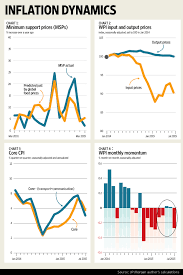
The impact of the recent increase in Minimum Support Price (MSP) on inflation would largely depend upon how the procurement will happen, noted the State Bank Of India in a latest update. Recently, Government hiked the minimum support price (MSP) of 14 Kharif (summer sown) crops by at least 1.5 times of the cost of production to address farmer’s distress in India. Out of 14 crops, seven crops witnessed hike of more than 20% compared to last year.
The SBI, in its latest edition of Ecowrap, noted that the outlook for inflation is evenly balanced till now and the impact of MSP on inflation will largely depend upon how the procurement will happen. Various estimates suggest that the Government decision to hike the minimum support price (MSP) of 14 Kharif (summer sown) crops will impact CPI inflation by 50-100 bps.
However, such estimated inflation impact could just be a statistical artefact and will only transpire if there is procurement by Government. It is well known that when the public agency starts procuring the crops at MSP, it ensures a convergence between market prices and MSP thereby impacting inflation. For the statistically minded, our estimate suggests that, post announcement of MSP with 150% hike in cost of production, the CPI inflation could increase by 73 bps and materialize in one or two quarters but it is purely subject to procurement by the Government /State Government. Without procurement the impact could be much lower (almost half of the 73 bps).
Interestingly, historical trends suggest that with no Government procurement, market prices have often fallen below MSP due to demand-supply dynamics. To make the MSP effective, it is thus absolutely imperative that the Government either procures/supplements through price differential scheme /PDS, noted the update.
0 thoughts on “Impact Of MSP On Inflation Largely Depends Upon Procurement”